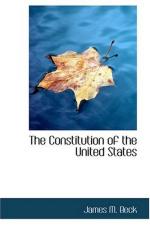“After the lapse of six thousand years since the creation of the world, America now presents the first instance of a people assembled to say deliberately and calmly and to decide leisurely and peaceably on the form of government by which they will bind themselves and their posterity.”
In the absence of any authentic information, the rumour spread through the colonies that the convention was about to reconstitute a monarchy by inviting the second son of George III, the Bishop of Osnaburg, to be King of the United States; and these rumours became so persistent as to evoke from the silent convention a semi-official denial. There is some reason to believe that a minority of the convention did see in the restoration of a constitutional monarchy the only solution of the problem.
On September 8 the committee had finally considered and, after modifications, approved the draft of the Committee on Detail, and a new committee was thereupon appointed “to revise the style of and arrange the articles that had been agreed to by the House.” This committee was one of exceptional strength. There were Dr. William Samuel Johnson, a graduate of Oxford and a friend of his great namesake, Samuel Johnson; Alexander Hamilton, Gouveneur Morris, a brilliant mind with an unusual gift for lucid expression; James Madison, a true scholar in politics, and Rufus King, an orator who, in the inflated language of the day, “was ranked among the luminaries of the present age.”
The convention then adjourned to await the final revision of the draft by the Committee on Style.
On September 12 the committee reported. While it is not certain, it is believed that its work was largely that of Gouveneur Morris.
September 13 the printed copies of the report of the Committee on Style were ready, and three more days were spent by the convention in carefully comparing each article and section of this final draft.
On September 15 the work of drafting the Constitution was regarded as ended, and it was adopted and ordered to be engrossed for signing.
It may be interesting at this point to give the result of their labours as measured in words, and if the framers of the Constitution deserve the plaudits of posterity in no other respect they do in the remarkable self-restraint which those results revealed.
The convention had been in session for 81 continuous days. Probably they had consumed over 300 hours in debate. If their debates had been fully reported, they would probably have filled at least fifty volumes, and yet the net result of their labours consisted of about 4,000 words, 89 sentences, and about 140 distinct provisions. As the late Lord Bryce, speaking in this age of unbridled expression, both oral and printed, so well has said:




